
views
Maintaining Your Physical Health

Make your first prenatal care visit. Whenever you become pregnant, you will need to schedule your first prenatal care visit with your obstetrician. During this first visit, you will learn what to expect during each of your trimesters and begin to receive care that monitors both your health and the health of your fetus. During prenatal visits, your doctor will take your vital signs, take your family and medical history, talk to you about safety concerns, and help answer your questions.

Receive regular prenatal care. Early and regular prenatal care may help reduce the risk of low birth rate and other birth complications. Prenatal care is important to your health and the health of your baby, and regular visits allow your doctor to spot any health risks early on. During weeks 4 through 28 you’ll likely see your doctor about once a month. You’ll see them twice a month for weeks 28 through 36, and then weekly during weeks 36 until you give birth. Those who are older than 35 or have health conditions may see their doctor more frequently.

See your dentist. During pregnancy, your body releases certain hormones that can impact oral health, like progesterone and estrogen. These hormonal shifts make you more susceptible to gum disease, like gingivitis. You should see your dentist every six months for a cleaning and exam. It is important to brush, floss, and practice regular dental care throughout your pregnancy. Some insurance plans may include dental care during pregnancy.

Exercise regularly. Unless you’re experiencing complications, you should be regularly exercising throughout your pregnancy. Exercise helps to reduce your risk of some complications, lift your mood and energy levels, prevent excess weight gain, and improve sleep. Pregnant people should moderately exercise at least 30 minutes most days of the week. Talk with your doctor about your exercise routine. They may recommend that you not exercise if you are having medical complications, like anemia or preeclampsia. If you didn’t regularly exercise before your pregnancy, you should begin with as little as five minutes of exercise a day and gradually increase the duration until you reach 30 minutes a day. Avoid jumping straight into HIIT exercises or high impact exercise due to the pressure on your abdomen and pelvic floor. If you engaged in that type of exercise before, dial it down and dial it down as your pregnancy progresses.
Eating Healthy During Pregnancy

Eat enough protein, carbohydrates, and fat. A healthy diet provides the nutrition that you and your baby need. While your caloric needs will vary depending on your age, weight, and level of physical activity, you need to ensure that you eat the right nutritious foods. Consult your doctor, but as a guideline you should eat about 75-100 grams of protein, 6-11 servings of grain, 2-4 servings of fruit, 4 or more servings of vegetables, and 4 servings of dairy products each day. You do not need to drastically increase your calorie intake while pregnant. You should not increase your calories in your first trimester. Even during your second and third trimesters, you will only need to eat about 300 more calories each day.

Follow vitamin and nutrient guidelines. Beyond the main nutrient groups, you need to receive adequate amounts of calcium, iron, vitamin C, and folate during your pregnancy. Many people choose to take prenatal vitamins to supplement their diets. Here are the vitamin guidelines and a few foods where you can find these nutrients: 1000-1300 milligrams of calcium. Dairy products, like full cream milk and yogurt, and dark greens are good sources of calcium. 27 milligrams of iron. You can find iron in meats, fish, beans, and spinach. 80-85 milligrams of vitamin C. Citrus fruits (like oranges), melons, broccoli, cauliflower, and green peppers are good sources of vitamin C. 0.46 milligrams of folate. Folate, also called folic acid, can be found in dark green leafy vegetables and legumes.

Drink plenty of water. Medical professionals recommend that you drink at least 10 cups (2.4 liters) of fluids each day during pregnancy. Water should be the primary fluid that you drink. Water may be able to reduce some pregnancy symptoms, like constipation or excessive swelling.
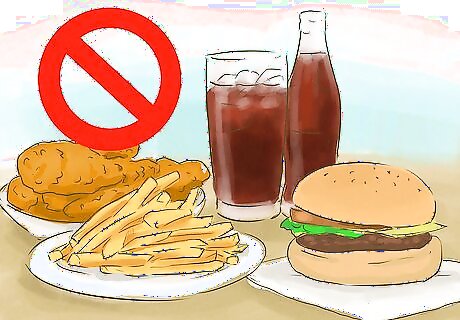
Lower your risk for gestational diabetes. Gestational diabetes occurs when your body cannot make and use all the insulin that it needs while you are pregnancy. This may occur if you gain too much weight during pregnancy or if your weight is unevenly distributed around your abdomen, increasing pressure around this area. You can lower your risk by limiting your fat intake to less than 30% of your daily calories, maintaining a healthy weight, and exercising regularly while pregnant. To treat gestational diabetes, you will need to eat special meal plans and to schedule your physical activity. If it is severe, your doctor may prescribe insulin treatments. If you have gestational diabetes, your pregnancy will be considered high risk. You may need to be monitored by your doctor more frequently. If diagnosed and treated, gestational diabetes will usually disappear shortly after the baby is born.
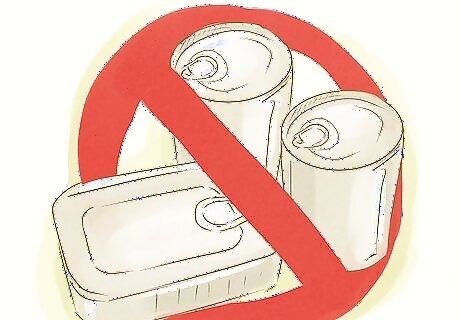
Limit your consumption of processed foods. Your diet should be primarily comprised of nutritious and low-processed foods, like whole grains and vegetables. Processed foods, like soda or candy, contain chemical additives like artificial sweeteners and preservatives. In particular, avoid any processed meats like luncheon meat, hot dogs, and processed seafood.

Be extra cautious with seafood. Raw or undercooked products may contain harmful parasites, bacteria, and viruses that pose a serious health risk. You should also avoid eating certain seafood. While fish can provide some healthy nutrients while you're pregnant, you should ensure that it is properly cooked. According to the FDA, pregnant people can eat up to 12 ounces of seafood that is low in mercury, like salmon, tilapia, and shrimp each week.
Practicing Self Care

Get enough sleep. Sleep is very important during your pregnancy, but some pregnant people find it more difficult to get a restful night’s sleep. Research has shown that those who sleep less than six hours a night are significantly more likely to have more difficult deliveries or have a Cesarean sections than those that sleep seven or more hours a night. Try to sleep at least seven hours a night, and to nap as frequently as you need. Try to keep your exercise, caffeine consumption, and naps earlier in the day to help fall asleep more easily.

Know the signs of depression. During pregnancy, many people experience mood swings as a result of hormonal changes, increased stress or anxiety, and environmental factors. Depression is a mood disorder that causes sadness and hopelessness, and while depression can occur during any life stage, it can be difficult to cope with the disorder during pregnancy. If you notice a combination of these symptoms nearly every day for the past two weeks, talk to your medical provider to see whether you may be diagnosed with depression. Symptoms include: Frequent crying Having trouble concentrating Losing interest in daily activities, even those you once found very enjoyable Having low energy or extreme fatigue that does not improve with rest Suicidal ideation Overwhelming feelings of guilt, sadness, or worthlessness Feeling “blue,” “sad,” or “empty” for most of the days Feeling anxious

Limit your stress. Occasional stress is a normal part of pregnancy, just as it is during other times in your life. Many people experience some anxiety or fear about becoming mothers and coping with pregnancy. However, constant and high levels of stress can be damaging for you and your baby’s health. Try to limit the amount of stress that you’re under by managing your stress. Find ways to de-stress like relaxing, meditating, doing yoga, drawing, or reading a book. If you find yourself feeling overwhelmed, consider talking to a friend, family member, or a therapist about your concerns and worries. Taking lamaze or pregnancy support classes can keep you busy and reduce stress during your pregnancy. These classes will provide support and understanding by teaching you how to care for your baby. Aromatherapy can help you de-stress and relax. Add a relaxing scent you like, like lavender, to a scent diffuser before bed or whenever you're feeling stressed.

Get help in an abusive relationship. Unfortunately, pregnancy can be a major stressor on a relationship and is a common trigger for domestic violence. According to the Center for Disease Control, 4 to 8 percent of pregnant people report abuse during their pregnancy. This number may be much higher because people may be afraid to report their abuse. Domestic abuse is a crime and is never justified. It poses a severe health and safety risk to you and your baby. Call an emergency number like 911, the police, or a domestic violence hotline if you are ever afraid your partner may abuse you.
Avoiding Toxic and Harmful Substances
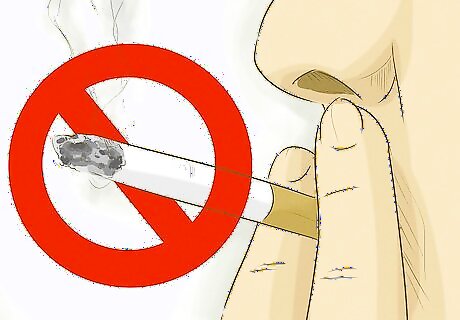
Give up any tobacco use. Smoking and using smokeless tobacco, including e-cigarettes, is dangerous during your pregnancy. If you are a tobacco user, you need to stop immediately when you are pregnant. Tobacco use exposes a fetus to dangerous chemicals and toxins, limits their oxygen supply and hinders the delivery of nutrients. It is also dangerous to your health. By stopping your tobacco product use, you may reduce your risk of low birth rate, pregnancy loss, infant death, premature birth, and other complications.
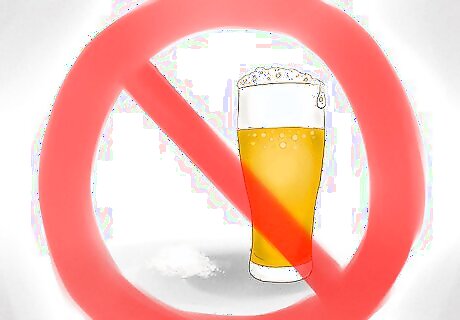
Do not drink alcohol. Doctors have not identified a safe level of alcohol for people to consume while pregnant. While they are unsure whether there may be a safe amount of alcohol to drink, they do know that excess alcohol consumption can lead to fetal alcohol syndrome. To be safe, do not drink at all during your first trimester. After that, ask your doctor if it is OK to have an occasional drink. If you have a drinking problem, contact a medical provider immediately to develop a treatment plan to help you quit drinking.

Avoid any illicit narcotics. Illegal narcotics, like cocaine, heroin, or methamphetamines are extremely dangerous for your baby. Narcotics can affect your baby’s development, your labor and delivery, and their overall health. These drugs can pass through the placental barrier and affect your baby directly. Babies born to mothers addicted to illicit substances, or mothers who use drugs occasionally, face birth complications, seizures, developmental issues, mental problems, and increased risks for health problems during their lifetime. There is no safe amount of narcotics that your baby can be exposed to. That said, by stopping drugs early in your pregnancy, you can reduce your baby's risk of developing a problem. Talk to your medical provider about establishing a treatment plan if you are struggling with narcotic use. Be aware that in some states and countries, healthcare providers will drug test expectant mothers.

Talk to your doctor about safe medications. When you are pregnant, you need to be extremely careful with any over the counter and prescription medications that you take. Consult with your doctor about any prescription medications, like cholesterol or blood pressure medication, you take during your first prenatal visit. You may or may not need to stop taking these medications, or begin taking a pregnancy-safe alternative. You should also ask about any over the counter medications you may take, like pain relievers or allergy medication. Medications that are safe for non-pregnant people may not be safe for pregnant people. Do not make any assumption about the risks associated with certain medications, and consult your doctor before taking any new medications.
Treat any sexually transmitted diseases. Diseases like syphilis, gonorrhea, or HIV can pass onto the baby when they are born. If you have been diagnosed with an STD, talk to your doctor about treating it and reducing your baby's risk of contracting it. Some STDs can be safely treated with medication during pregnancy while others, including HIV/AIDS and hepatitis B, may require special antiviral drugs and frequent monitoring. Avoid having unprotected sex with new partners during pregnancy. Continue to get tested throughout your pregnancy.

Limit your caffeine intake. Caffeine can affect your baby’s development during pregnancy. Limit the amount of caffeine in your diet to less than 200 milligrams a day. For reference, 8 ounces of coffee contains about 91 milligrams of caffeine. Switch to decaffeinated teas, sodas, and coffees during pregnancy to limit your caffeine intake, or drink non-caffeinated fluids like water and milk.
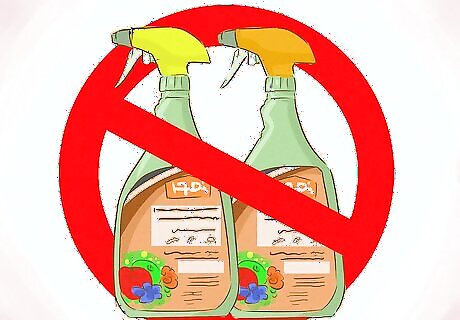
Switch to all natural household cleaners. Household cleaners can contain powerful chemicals that are harmful to unborn children. They can also contain noxious odors that may trigger nausea or headaches. Wear gloves when you’re using cleaning products to limit your exposure through skin contact and open a window or turn on a fan to ventilate the space.

Do not use products made with BPA. Bisphenol A (BPA) is an industrial chemical used to make hard plastics, and is also used as a liner in many canned foods. While research is still being done on the extent and effects of BPA on babies, BPA is an endocrine disruptor that may disturb fetal development. You can look for canned foods that are labeled as “BPA-free”, and use BPA alternatives. For example, you can use BPA-free and glass containers.















Comments
0 comment